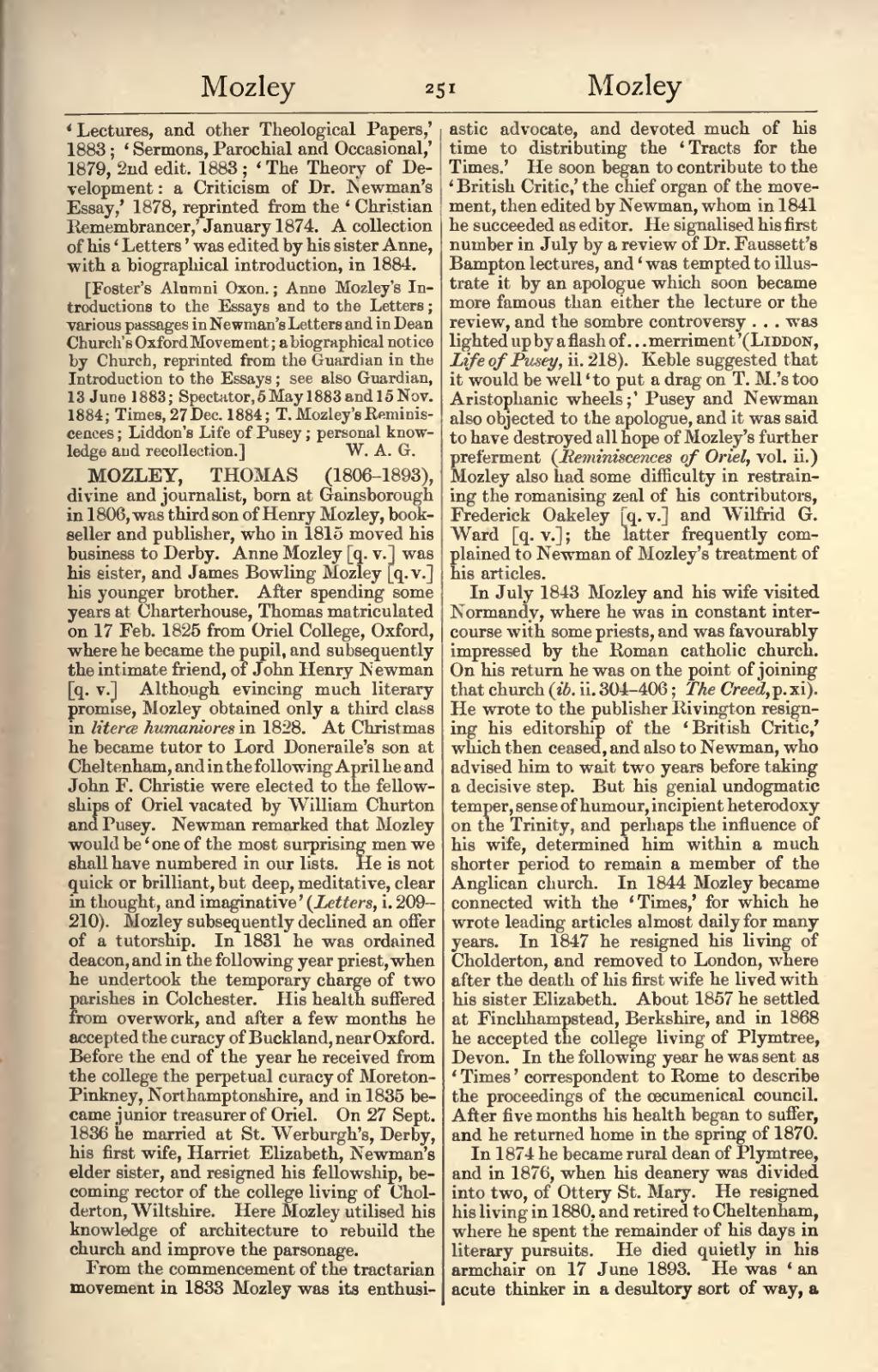'Lectures, and other Theological Papers,' 1883 ; ' Sermons, Parochial and Occasional,' 1879, 2nd edit. 1883 ; ' The Theory of Development : a Criticism of Dr. Newman's Essay,' 1878, reprinted from the ' Christian Remembrancer,' January 1874. A collection of his ' Letters ' was edited by his sister Anne, with a biographical introduction, in 1884.
[Foster's Alumni Oxon. ; Anne Mozley 's Introductions to the Essays and to the Letters ; various passages in Newman's Letters aud in Dean Church's Oxford Movement; a biographical notice by Church, reprinted from the Guardian in the Introduction to the Essays ; see also Guardian, 13 June 1883; Spectator, 5 May 1883 and 15 Nov. 1884; Times, 27 Dec. 1884; T. Mozley's Reminiscences ; Liddon's Life of Pusey ; personal knowledge and recollection.]
MOZLEY, THOMAS (1806–1893), divine and journalist, born at Gainsborough in 1806, was third son of Henry Mozley, bookseller and publisher, who in 1815 moved his business to Derby. Anne Mozley [q. v.] was his sister, and James Bowling Mozley [q.v.] his younger brother. After spending some years at Charterhouse, Thomas matriculated on 17 Feb. 1825 from Oriel College, Oxford, where he became the pupil, and subsequently the intimate friend, of John Henry Newman [q. v.] Although evincing much literary promise, Mozley obtained only a third class in literæ humaniores in 1828. At Christmas he became tutor to Lord Doneraile's son at Cheltenham, and in the following April he and John F. Christie were elected to the fellowships of Oriel vacated by William Churton and Pusey. Newman remarked that Mozley would be 'one of the most surprising men we shall have numbered in our lists. He is not quick or brilliant, but deep, meditative, clear in thought, and imaginative' (Letters, i. 209-210). Mozley subsequently declined an offer of a tutorship. In 1831 he was ordained deacon, and in the following year priest, when he undertook the temporary charge of two parishes in Colchester. His health suffered from overwork, and after a few months he accepted the curacy of Buckland, near Oxford. Before the end of the year he received from the college the perpetual curacy of Moreton-Pinkney, Northamptonshire, and in 1835 became junior treasurer of Oriel. On 27 Sept. 1836 he married at St. Werburgh's, Derby, his first wife, Harriet Elizabeth, Newman's elder sister, and resigned his fellowship, becoming rector of the college living of Cholderton, Wiltshire. Here Mozley utilised his knowledge of architecture to rebuild the church and improve the parsonage.
From the commencement of the tractarian movement in 1833 Mozley was its enthusiastic advocate, and devoted much of his time to distributing the 'Tracts for the Times.' He soon began to contribute to the 'British Critic,' the chief organ of the movement, then edited by Newman, whom in 1841 he succeeded as editor. He signalised his first number in July by a review of Dr. Faussett's Bampton lectures, and 'was tempted to illustrate it by an apologue which soon became more famous than either the lecture or the review, and the sombre controversy . . . was lighted up by a flash of. . . merriment' (Liddon, Life of Pusey, ii. 218). Keble suggested that it would be well ' to put a drag on T. M.'s too Aristophanic wheels;' Pusey and Newman also objected to the apologue, and it was said to have destroyed all hope of Mozley's further preferment (Reminiscences of Oriel, vol. ii.) Mozley also had some difficulty in restraining the romanising zeal of his contributors, Frederick Oakeley [q. v.] and Wilfrid G. Ward [q. v.] ; the latter frequently complained to Newman of Mozley's treatment of his articles.
In July 1843 Mozley and his wife visited Normandy, where he was in constant intercourse with some priests, and was favourably impressed by the Roman catholic church. On his return he was on the point of joining that church (ib. ii. 304-406 : The Creed, p. xi). He wrote to the publisher Rivington resigning his editorship of the 'British Critic,' which then ceased, and also to Newman, who advised him to wait two years before taking a decisive step. But his genial undogmatic temper, sense of humour, incipient heterodoxy on the Trinity, and perhaps the influence of his wife, determined him within a much shorter period to remain a member of the Anglican church. In 1844 Mozley became connected with the 'Times,' for which he wrote leading articles almost daily for many years. In 1847 he resigned his living of Cholderton, and removed to London, where after the death of his first wife he lived with his sister Elizabeth. About 1857 he settled at Finchhampstead, Berkshire, and in 1868 he accepted the college living of Plymtree, Devon. In the following year he was sent as ' Times ' correspondent to Rome to describe the proceedings of the oecumenical council. After five months his health began to suffer, and he returned home in the spring of 1870.
In 1874 he became rural dean of Plymtree, and in 1876, when his deanery was divided into two, of Ottery St. Mary. He resigned his living in 1880. and retired to Cheltenham, where he spent the remainder of his days in literary pursuits. He died quietly in his armchair on 17 June 1893. He was 'an acute thinker in a desultory sort of way, a
